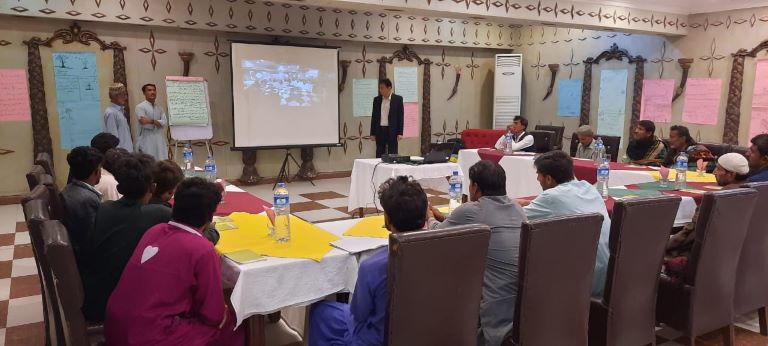Capacity Building of WWF-Pakistan’s CBOs on Sustainable Management and Protection of Mangrove Forests in the Coastal Areas of Pakistan
Featured Members

Eco-Conservation Initiatives (ECI) is working to protect the environment and restore ecosystems by adopting Nature Based Solutions (NBS). Its mission is focused on conserving natural resources and fostering human development through sharing knowledge, exchanging practices, and co-creating the future in line with the spirit of inclusive capitalism. ECI is working to make economies more sustainable with the multi-sectoral and climate-resilient development approach where climate change adaptation and mitigation are the core to our interventions. We emphasize promoting circular economy and employing clean energy to minimize hazardous wastes and enhance overall productivity reducing the carbon footprints in all the relevant value chains.
Context
Pakistan, with a coastline to over 1,000 Kms, is home to some of the largest mangrove forests in the world. They are one of the most valuable ecosystems, providing a range of benefits for both humans and wildlife. They play a critical role in supporting local livelihoods, protecting coastal communities from natural disasters, preserving biodiversity, stabilizing coastline, regulating climate, and providing habitats to fish and other marine life. Despite several benefits, they are currently facing a range of threats including overexploitation, climate-induced disasters, rising sea levels, increased temperature, changing rainfall patterns, and lack of community involvement.
Community-based training and capacity building is essential for the protection and conservation of mangrove forests in Pakistan. It involves developing the knowledge, skills, and abilities of local communities to support the conservation of mangrove forests and protect community livelihoods.
Introduction
In partnership with World Wide Fund for Nature (WWF-Pakistan), we– a passionate member of Council for Inclusive Capitalism – conducted the Training Need Assessment (TNA) of eight Community Based Organizations (CBOs) followed by the development of the Training Manual. The Training Manual consists of different modules prepared in line with the TNA and was implemented to train and build capacity of about 200 members of CBOs, including the office bearers from the coastal areas of District Sujawal and District Thatta, by holding eight 5-day capacity building training workshops in two parallel sessions 18 days. It was supported by the German Federal Ministry of Economic Cooperation and Development (BMZ) as engaging local communities in the management of mangrove forests can help to ensure their sustainable use. Each CBO consisted of 19 – 22 participants who were imparted training based on pre-designed PowerPoint training contents.
The training was particularly aimed at climate action (SDG-13), protecting life below water (SDG-14), life on land (SDG-15), strong institutions (SDG-16), partnerships (SDGs-17) as well as clean water & sanitation (SDG-6), sustainable communities (SDG-11), responsible consumption and production (SDG-12). Since these SDGs are highly integrated, their adoption and effective achievement is expected to sustainability of ecosystem and protection of mangroves-based as well as a range of alternative livelihoods for the local communities, such as sustainable agriculture, livestock management, eco-tourism, non-timber forest products, and vocational skills including boat-making & repairing, kitchen gardening, automobile workshops, mobile phone repairing, tailoring and masonry, etc.
Training Contents
The training workshops for all eight CBOs were conducted in two different training halls under two trainers and facilitators with an interactive introduction of the participants followed by the introduction of the project for community-based conservation of mangroves and resilience of relevant communities. Following were main contents of the training curricula:
• Leadership
• Office management
• Record keeping skills
• Communication skills
• Mangroves ecosystem and associated Natural Resource Management (NRM)
• Mangroves based as well as gender based alternative livelihoods
• Value Chain Development (VCD)
• Conflict management
• Decision-making skills
Training contents were thoroughly covered during the 5 days’ sessions.
Training Methodology
Training methodology was highly interactive. Education & skills were imparted to the participants through a PowerPoint presentation, pictorial overview, video clips, group work activities as well as some of the local language brochures already prepared by WWF-Pakistan and shared with all the CBOs. Participants learned effected ways to communicate and distribute information, value chain development, conflict management and resolution, and how to implement collective action.
Results
Pre-test, post-test, and post training evaluation projected very encouraging results and comparisons between pre and post-test as the interactive approach engaging participants in group work brought promising signs of their growth that was clearly visible in the flip charts affixed on the walls of the training halls.
Behavior of the participants has been exemplary. They duly conformed to the norms as set earlier during the introductory session . During first two sessions of the training, participants were taking it as casual or merely a fun activity. Nonetheless, they got actively engaged in the main subject matter due to the engagement style of the trainers. Moreover, they were actively participating in Q/A session, which reflected their keenness in the training.
One of the best behaviors noticed was their follow up during group work activities on what they learned during the session. Almost all the participants took an active part in the group work as well as Q&A sessions during and after the relevant video clips. In addition to this, they have also been sharing some very useful suggestions for their active learning by doing approach during the sessions.
In addition to this, the participants have also been sharing some very useful suggestions based on their experiences of managing small-scale projects related to livelihoods building. With mutual exchange of that information with the trainers, they further strengthened their “learning by doing approach.”
The CBO participants and trainees were found quite humble and committed to get further engaged in alternative livelihoods activities. In addition to this, the trainer helped them build their quarterly plan of actions to do relevant activities which don’t require funds such as reading the already published material, develop their small-scale community-based projects, enhance their social networking and find out what else could be done collectively in view of building resilience in the local communities so that they could better address challenges of the near future posed by the climate induced disasters.

